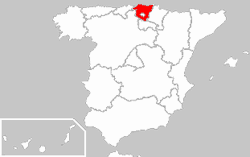Basque Country (autonomous community)
From Wikipedia, the free encyclopedia.
|
|||
 |
|||
| Capital | Vitoria-Gasteiz | ||
| Official languages | Basque and Spanish | ||
| Area – Total – % of Spain |
Ranked 14th 7 234 km² 1,4% |
||
| Population – Total (2003) – % of Spain – Density |
Ranked 7th 2 108 281 5,0% 291,44/km² |
||
| Demonym – English – Basque – Spanish |
Basque euskal herritar, euskaldun vasco/a, vascongado/a |
||
| GDP | GDP/Cápita 30.680 US$ | ||
| ISO 3166-2 | PV | ||
| Parliamentary representation – Congress seats – Senate seats |
19 3 |
||
| President | Juan José Ibarretxe Markuartu (PNV) | ||
| Eusko Jaurlaritza/Gobierno Vasco | |||
Basque Country (Basque Euskadi, Spanish País Vasco) is an autonomous community within Spain, the capital of which is Vitoria (Basque Gasteiz). It is part of the larger Basque native lands, which are also called the “Basque Country.”
The following Spanish provinces make up Basque Country:
| Álava | (Basque Araba) | capital Vitoria | (Basque Gasteiz) |
| Vizcaya | (Basque Bizkaia) | capital Bilbao | (Basque Bilbo) |
| Guipúzcoa | (Basque Gipuzkoa) | capital San Sebastián | (Basque Donostia) |
Before the Spanish Constitution of 1978 and its system of autonomous communities, these three provinces were known in Spanish as the Provincias Vascongadas, a term still used by some nostalgics of the Franco era and by independentists who despise the current autonomy and reserve "Basque Country" for the union of the seven territories.

Economy
The economy of the Basque Country is one of the most developed in Spain. In 2004, its GDP (PPP) per capita was at 120.6% of the EU average [1]
| Autonomous Communities of Spain | |
|---|---|
| Andalusia | Aragon | Asturias | Balearic Islands | Basque Country | Canary Islands | Cantabria | Castile–La Mancha | Castile–Leon | Catalonia | Extremadura | Galicia | Madrid | Murcia | Navarre | La Rioja | Valencia | Ceuta | Melilla | Plazas de soberanía | |
|
|
|
|---|---|
| Hegoalde: Gipuzkoa | Araba | Bizkaia | Nafarroa Iparralde: Lapurdi | Nafarroa Beherea | Zuberoa |
|


